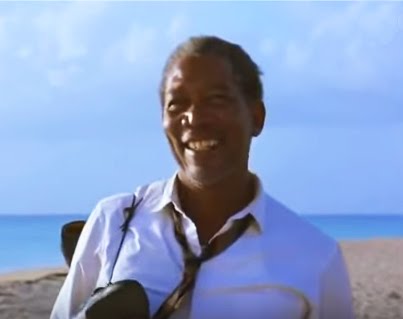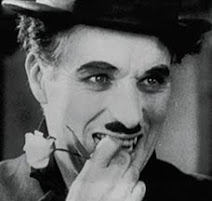Ruh-Roh
A Funny Parody, When You're 9,000 Miles Away. In West Africa? Not So Much.
Where you and I are standing / At the end of the century /
Europes have sprung up everywhere / as even I can see /
There on the horizon / There's a possibility /
Some bug from out of Africa / will come for you and me/
Destroying everything in its path / from sea to shining sea /
Like the Great nations of Europe / In the 16th century
-- Randy Newman, "The Great Nations Of Europe"
El Rog The Magnificent, trapped in his own veal pen at work, as I am, made another as-usual-trenchant observation about the current health crisis in America earlier this week after the announcement that the first nurse from Dallas Presbyterian had been hospitalized.
"The government says, 'We have the finest healthcare system in the world', and, 'We're not like Africa -- it can't happen here'," El Rog says. "Everyone goes to sleep. You want the government and people in this country to wake up and pay attention? Then you don't say 'Ebola' -- you say, 'Zombie Apocalypse'. Then they'll pay attention."
 The Ebola epidemic is horrifying. Not because its further spread will have an unknown effect on the politics of fragile 'African Domino' states. Not because of an effect to world financial markets; and not because of the possibility that its exponential progression will almost guarantee a wider spread into Europe, America, or Asia. It's horrifying, because human beings living in scrabbling poverty with little hope are dying, faster and faster.
Someone Else's Problem
On Tuesday, the World Health Organization announced that in west Africa, Ebola has claimed more lives. They estimate that if the disease continues to infect humans at the same exponential rate, this outbreak will produce a minimum of 5,000 new cases per week by the first of December, and (worst-case) as many as 10,000.
Before September 28, when symptoms of the first patient in the U.S. were finally recognized and he was admitted to a hospital, spokespersons for the World Health Organization and Doctors Without Borders had gone in front of the media and done everything but scream at the UN, EU and American governments for not organizing resources and money to contain and reverse what was happening in Africa. They warned that the epidemic was "spiraling out of control", that the window of opportunity to deal with a massive health crisis was closing.
The Ebola epidemic is horrifying. Not because its further spread will have an unknown effect on the politics of fragile 'African Domino' states. Not because of an effect to world financial markets; and not because of the possibility that its exponential progression will almost guarantee a wider spread into Europe, America, or Asia. It's horrifying, because human beings living in scrabbling poverty with little hope are dying, faster and faster.
Someone Else's Problem
On Tuesday, the World Health Organization announced that in west Africa, Ebola has claimed more lives. They estimate that if the disease continues to infect humans at the same exponential rate, this outbreak will produce a minimum of 5,000 new cases per week by the first of December, and (worst-case) as many as 10,000.
Before September 28, when symptoms of the first patient in the U.S. were finally recognized and he was admitted to a hospital, spokespersons for the World Health Organization and Doctors Without Borders had gone in front of the media and done everything but scream at the UN, EU and American governments for not organizing resources and money to contain and reverse what was happening in Africa. They warned that the epidemic was "spiraling out of control", that the window of opportunity to deal with a massive health crisis was closing.

For months, caregivers in the field and the epidemiologists in their labs were struggling against the perception in western Europe and America that yes, Ebola was a terrible hemorrhagic viral disease -- but a remote African disease, an African problem. Similar illnesses had popped up in single, isolated cases in the west, the media reminded us, and all were quickly contained because of a superior healthcare infrastructure.
We were also reminded that it was harder to contract the disease than flu, malaria, or half a dozen other illnesses endemic in west Africa. But through the spring and into the summer, the outbreak spread and epidemiologists knew it was different than any sporadic, rural brushfire outbreak in the past: for the first time, Ebola had found its way into urban areas.
But, the EU and United States governments were too preoccupied with their own internal politics and economic situations to listen very closely to the alarms being sounded by international public health agencies and NGO's. Not doing more to help reverse the progression of the disease almost guaranteed that, sooner or later, the danger which had come out of the forest would begin spreading beyond Africa.
It's Money That Matters
America has emerged, superficially, from the worst effects of The 2008 Crash. Our economy is still wounded from the excesses of the Bush years: America spent a trillion dollars violently projecting itself into the world during a decade marked by a War On Terra.
Many people have amnesia around the damage done by the excesses of an unregulated shadow banking system: the U.S. economy lost over a Trillion dollars in personal worth -- at one stage, the Dow Jones had declined by ten thousand points. Some few made money -- the Blankfeins, the Moxilos, the Fulds; they made an aggregate hundreds of millions of dollars, personally. Meanwhile, millions lost their homes, their savings, and their jobs; lives were destroyed. In the wake of a ten-year Forever War and the destruction of its middle class, America prefers to ignore what happens in the rest of the world as much as possible.
For its part, the European Union after the 2008 Crash has spent years teetering on the brink of dissolution. The fragile economies of Portugal, Italy, Greece and Spain were kicked to the curb by the failures and excess of the financial crisis. There was public talk in member states of abandoning the Euro, which would effectively have meant the end of the Union.
The EU is a hard-won culmination of an old idea: to prevent future European wars and to develop economic power to compete with the West or East. To those who believe in a united continent, returning to a splintered, every-country-for-themselves Europe is unthinkable. To shore up the Union, its leaders preached a combination of forced austerity programs (the stick), and loans for EU states like Greece (the carrot), principally underwritten by Germany's banks.
It's worked so far -- but the veneer of recovery in the EU is even thinner than in America. Instead of a single integrated national economy, they have 28 separate ones. The German economy now appears to be losing power, and sudden expenditures to deal with a military or health crisis could break the delicate balance of shoring up the EU's weak economies.
As the United States retreated from Empire, a civil war broke out in Syria and has ground on for two years; America dithered for a year and a half over providing support for moderate Syrian rebels. The Arab Spring erupted; Libya destabilized, and Egypt went through two revolutions; the Israeli - Palestinian conflict exploded.
And this spring, a real wolf appeared at the door: ISIS -- violent, murderous, oppressive. America and Europe hesitated in dealing with it, and even when the Islamic fascists began seizing more territory in Syria, northern Iraq and Kurdistan, the U.S. continued to waver. Now, ISIS' gains have brought it to the doorstep of Baghdad. It's clear that bombing alone may degrade ISIS but not stop it -- however, America is not about to re-introduce troops into Iraq, or anywhere.
Making it even more complex is the split between the Shiite and Sunni branches of Islam. For generations, the west (America in particular) has supported the Sunni House Of Saud -- but since 1979 Iran has risen to dominate the Shiite world, and their intent is to eventually dominate the Islamic world -- possibly with the threat of developing nuclear weapons.
Against the background of all this Sturm und Drang, Ebola began appearing on the radar of western governments as more than just something happening, you know -- over there.
America's Ebola Outbreak Will Be Televised
Na Gahana Happn: AMC's The Walking Dead
In the first week of September, the WHO and Doctors Without Borders described the Ebola outbreak in West Africa as spiraling out of control . What prompted their near-panic wasn't only what was being seen on the ground, but statistical models of the outbreak's progression created in the United States and Europe showing a steep rise in the number of total cases.
It's only a guess, but when the models were presented to the National Institutes of Health and the Centers For Disease Control, it got people's attention. Worst-case scenarios predicted total case numbers at over a million infected by January of 2015 -- and with a current 70% case fatality rate, this meant deaths in the hundreds of thousands -- at which point the chance that Ebola will spread elsewhere becomes a near-certainty.
The further it spread, the harder each outbreak would become to control. There would be a strain on the healthcare system of any country where it appeared, possible disruption of transportation and supply networks, and a rising sense of panic -- difficult to control if there was a lack of public confidence in any government's ability to deal with the disease -- political instability, civil disorder. And It wasn't the Zombie Apocalypse, but close enough.
Some probably argued that if Ebola were to appear in America, containing the disease would be difficult -- but they were overruled by those who believed that kind of talk was alarmist. We need to prevent panic! Protocols to deal with infectious disease were in place, and we have the best healthcare system in the world!












